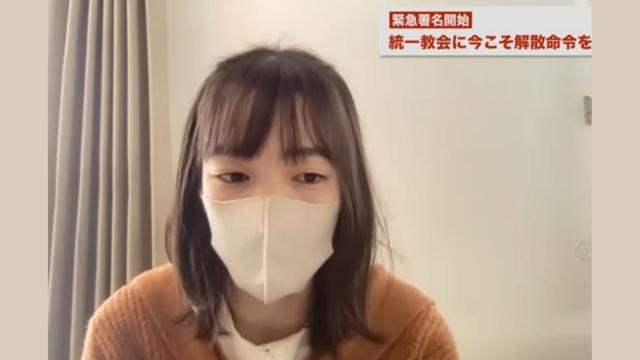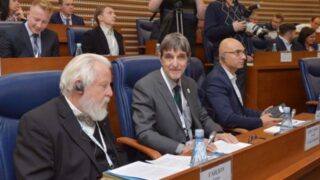The most famous ex-member of the Unification Church/Family Federation in Japan largely invented her story, her father and mother say.
by Masumi Fukuda
Article 2 of 5. Read article 1.


What follows is the story of Sayuri Ogawa’s parents. Although they have shared a parent-child relationship for a long period, there is now a hopeless gap between the respective perceptions of the same facts by the parents and by their daughter.
Her father, Yoshihiko, is in his late fifties and graduated from a well-known national university. He later studied at a graduate school affiliated with the former Unification Church in the U.S. Her mother, Masako (a pseudonym), is in her early 60s. She started working at a local supermarket after graduating from high school. After that, Masako’s elder sister joined the former Unification Church. Masako also learned about the Unification Church’s “Divine Principle” through her sister’s invitation, and ended up joining the church.
Yoshihiko and Masako were part of one of the church’s international mass weddings in Seoul, Korea in October 1988, and started their married life in the Ibaraki prefecture in 1992. Since then, they had six children: an eldest son, a second son, an eldest daughter, Sayuri, a second, a third, and a fourth daughter. The third and fourth daughters were adopted by other families.
Sayuri’s father, Yoshihiko, currently works for a company not connected with any religious organization but, from November 2003 to the end of January 2010, he served as head minister of Family Federation churches in various places.
The eldest daughter, Sayuri, was born in October 1995. Sayuri had excellent grades and leadership skills since she was a child. She loved being in public, and “had rather a show-off character,” Masako said.
Sayuri was well-known among the local second-generation members of the Unification Church. The church holds cultural festivals for junior high and high school students called the Chuwa Cultural Festivals. For three years in a row, during her high school years, Sayuri won the second prize in the high school speech category of one of these cultural festivals, which is held for the Aichi and Mie prefectures.
In her third year of high school, she lectured on the Unification Church’s “Divine Principle” and won the first prize in the Western Japan competition, and the second prize in the nationwide competition. She also won several other awards.
“She is extremely intelligent and hardworking. My husband had the highest expectations for her,” Masako said.
The parents could not believe their ears when they heard such a proud daughter repeatedly telling the media that she and her siblings were bullied at elementary school because they were poorly dressed, were called “stinky,” and were excluded from their peer groups on their way to and from school, all this because their parents had made large donations to the church and their family was poor.
“Our family was not financially able to make large donations, Masako said, because Sayuri’s father had spent a long time studying in the U.S. when our children were small. We were not able to tithe, i.e., donate one-tenth of our income. My daughter may think that we made large donations because we had pots, a two-stories pagoda, and a Maitreya statue at our home, and these are items normally given to church members who had made important donations. However, we had received these artifacts from deceased members of our congregation. My husband was requested from a bereaved family to take over these objects, and another co-religionist donated the Maitreya statue to us.


My husband thought that our daughter had misunderstood the reason we had the artifacts in our home, and on September 11, 2022, he explained to her why this had happened via LINE.
Our daughter, however, did not respond to his message, but posted on Twitter on September 16 that, ‘My parents seem to be completely unaware that they made large donations.
Now, let’s assume this, at the very least.
Even if my two parents’ salaries are 300,000 yen a month and they have been tithing for 30 years, this makes 30,000 (one tenth of 300,000) x 12 (months every year) x 30 years = 10.8 million yen.
Easily more than 10 million yen, and my parents said we were paying three tenths, so they donated more. This is what brainwashing is all about,’ she said. But we were never able to pay one-tenth, so there was no way we could donate three tenths of our salaries,” Masako insisted.
She shook her head when she was asked about Sayuri’s claim of being bullied and “excluded.”
“I asked Sayuri’s closest younger sister. She said she has never heard that Sayuri had been bullied. Even my eldest and second sons have never been bullied or excluded from their peer groups. What once happened was that Sayuri had been naughty with a friend, and her teacher at junior high school had warned her.”
In addition, Sayuri said she was forced to attend church events and religious activities since childhood, but her father, Yoshihiko, set the record straight. “Every three or four years or so, if there was a big convention or event at church on weekdays, I had my children absent themselves from school. When school club activities on Saturdays and Sundays overlapped with church services or events, I sometimes encouraged my children to prioritize the church activities. On the other hand, I prioritized their sport matches and other activities, including mini-basketball games, when they were at elementary school, over church events. And I have accompanied my children several times to matches held far away from home.”
Sayuri’s mother, Masako, also reported: “We have never taken away or banned television, music, books, or comics from our children. Sayuri loves singing and playing guitar, and performed in various live events. My husband and I took leave from our work to go and cheer her several times. Sayuri did not marry in one of the international mass marriages that are recommended by our church’s teachings, but my husband and I have never fought her about it. In the first place, we never told her ‘You will go to hell if you fall in love.’ We have been to our daughter’s wedding, and sincerely celebrated their marriage. We were also really happy about her pregnancy and delivery. We even went to take care of her immediately after the baby was born.”
Masako also emphasized that it would have been impossible for Sayuri to win the second prize and awards at the Family Federation contests if she had been forced to participate against her will. She won the awards because she wanted to participate in these contests, and even asked to go there. In her high school days, Sayuri did not question or worry about the church’s doctrine. She rather enjoyed the liberal school life. “I heard she was popular because her face was a little male-looking and handsome. I also heard she discussed with her friends the fact that he attended the church openly,” Yoshihiko said.


According to Yoshihiko, it is also not true that the family verbally abused Masako’s non-self-sufficient mother, telling her “You should die,” or beat and kicked her. It is true that there was a long-standing feud between Masako and her mother, and there were some heated arguments, but there was never any violence or “death wish” at all. And the quarrel between mother and daughter started since when Masako was old enough to remember, and was not caused by the Unification Church.
In February 2014, Sayuri participated in a 21-day training session at the Chiba Central Training Center of the Family Federation during her spring break, just before graduating from high school. She claimed in the media that she was sexually harassed during this training session, for example by being caressed on the head and hugged by a male group leader. She also said that she had reported the incident to her mother, but Masako claims she never heard of it.
In fact, at that time, Sayuri told a church staff that she had received an e-mail from this male group leader after returning home from a training session. But Sayuri did not tell the church staff that she had been sexually harassed. However, since the Family Federation teaches a strict sexual morality as part of its doctrine, the staff thought there was a problem even if the male group leader had just sent an e-mail to a female believer. The staff reported the e-mail issue to the chief of the Chiba Central Training Center. After receiving the report, the chief questioned the male group leader, and found out that in fact she had talked to him often, so he did not feel there was anything wrong in writing a message, and they had exchanged a few e-mails only.
At that time, she also sent an e-mail to another church staff, where she said, “I felt the male group leader’s gaze,” but again, she did not mention sexual harassment. In other words, she suddenly “remembered” the sexual harassment incident only after she had started talking to the media.
Sayuri then participated three times in 40-day training sessions at the Cheongpyeong Training Center at the headquarters of the Family Federation in Korea. However, during these training sessions, she talked strangely with the Korean male staff, and they were embarrassed.
In mid-September 2014, during the third training session that had started on July 30 of the same year, something unusual happened to her body. Suddenly, Sayuri felt as if her voice had changed to that of an aggressive woman, and she began to go out of control. Several male staff restrained her and transported her to a hospital adjacent to the Cheongpyeong Training Center.
Her mother Masako went to Korea immediately, arriving on September 16. Seeing her mother’s face, Sayuri was relieved and calmed down, and left the hospital on the following day, September 17. The doctor told Masako about her daughter’s condition, “Be careful, she tends to get stressed easily.” Sayuri loved the Cheongpyeong Training Center, and wanted to return there for the training session. But the staff was concerned about her physical and mental condition, and recommended she should go back home as soon as possible. She and her mother went home on September 30.
In January 2015, the following year, Sayuri enrolled in a vocational school in Nagoya to be trained as a counselor. However, she quitted after four or five lessons, claiming that, “I could not go there because I was chased by a stalker.”
In August and October, she participated in a church’s training session in Korea again. Around this time, she sang as a vocalist in a band formed by her father, Yoshihiko, and at the end of that year, she participated in a Family Federation event and sang.
In 2016, Sayuri became mentally unstable again. She went to mental clinics and was transferred to a hospital because of her hyperventilating. In 2017, Sayuri began living by herself in an apartment, although her mental condition had not improved. Before and after she left her parents’ home, she was hospitalized at a national medical center for a few days.
Masako said, “There are several cases of depression or manic depression (bipolar disorder) on my side of the family. Some even committed suicide. I think that Sayuri’s mental disorder is genetic. My daughter says that the Unification Church caused her mental illness, but I don’t think it has anything to do with it. I myself have not heard the name of the disease directly from the doctor, but my daughter says she has been diagnosed with depression, panic disorder, and so on.”
Sayuri, on the other hand, was very enthusiastic about her musical activities. She sang at events held by local churches with Yoshihiko, and also played guitar on her own. She was also very close to her father.









